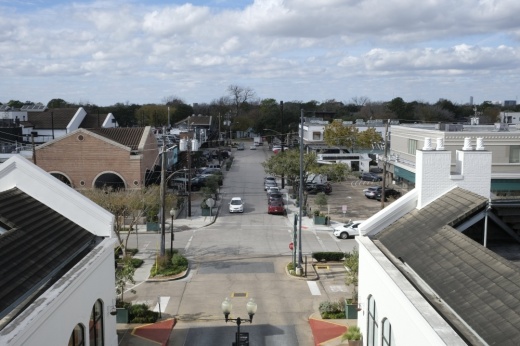The Village has gone through shifts in demographics from its university student/bohemian phase in the ’60s and ’70s to its local stores from the ’80s to 2000s, according to Melissa Kean, an author and retired historian with Rice.
“In the ’60s, one of the things that’s changed a lot is with students it wasn’t super common for everybody to have a car,” Kean said. “So Rice Village was like the center of where they could walk to.”
Maps of Rice Village in 1968 show how the area catered to the student population: Stores such as Weingarten’s Grocery, the Village Laundromat and Otto Office Supply as well as a U.S. post office covered the bare essentials for Rice University’s population.
Toward the start of the ’80s, development of high-end housing in West University Place shifted the landscape of Rice Village as shops began catering to residential clients.
“Faculty bought houses [in West University Place], and so things were modest; you’d have a vacuum repair shop,” Kean said. “There is no such thing today. Everything got more affluent; even the students got more affluent.”
Rice University began charging students for tuition in 1965. Once they started charging tuition, the student body also became more affluent, Kean said.
While several stores still carried essential goods and services for students, many of the newer openings exemplified this shift in wealth. Multiple jewelers and shoe stores, a guitar shop and a smattering of beauty supply outlets came to the center.
While Rice Village maintains some of the local feel of its previous iterations, a comparison of site maps from 1980, 2001 and 2021 suggest a shift away from local mom and pop shops and toward larger retail chains.
Management history
Land in and around Rice Village has been owned by Rice University since the mid-1980s, but the commercial property on that land has shifted management over the years.
In 2014, the Rice Management Co. bought out Weingarten Realty, which had owned and managed the Village Arcade, the southern half of Rice Village between Amherst Street and University Boulevard, for more than 20 years.
Property management has changed hands two more times since going from the Fort Worth-based Trademark Property Co. in 2014 to the current Houston-based Realtors REIS Associates.
Trademark began the shift toward the character of the current Village, according to a 2014 press release. In partnership with Rice, Trademark officials said they planned to enhance the streetscape, landscaping, storefronts and facades in a way that “will set the stage for the modern evolution of this eclectic urban mixed-use district.”
REIS Associates, a private real estate company, has been managing the Village Arcade part of Rice since July 2019.
Aj Jennings, REIS’ general manager of Rice Village, said maintaining that local mom and pop feel remains a priority.
“The whole idea behind having a shopping environment and village is for people to stroll and to go into shops,” Jennings said. “We still want to make sure that we have mom and pop shops that might be the only ones in the city.”
At least 11 establishments were new to open in Rice Village in 2021. Eight of those new businesses were national chains, such as the ice cream shop Van Leeuwen and home and furniture stores CB2, Lovesac and West Elm.
Comparatively, Badolina Bakery, Christina Greene Jewelry and Cru Home, a furniture/decoration pop-up store, were among the locally owned businesses that opened in Rice Village last year, based on previous •Community Impact Newspaper •reporting.
REIS, though a newer addition, has left its own mark, adding “tens of thousands of dollars” in landscaping in 2021, according to Jennings.
“We want people to come and spend time at Rice Village,” Jennings said. “We also have a focus on bringing really fine restaurants to the market, and we’ve been doing that with ones that are opening up this year.”
Hamsa, an Israeli cuisine restaurant; Sweet Paris, a creperie chain that began in Houston; and Rice Box, Chinese/American takeout with three other locations throughout Houston, are all restaurants planned to open in Rice Village in 2022, Jennings said.
Cost of doing business
With the shift to selling high-end goods and services as well as multiple building renovations, property values in Rice Village have increased since 2014, according to data from the Harris County Appraisal District.
Average property value in the Village has risen 15.26% since 2018, an average growth of 3.8% per year. By comparison, between 2014 and 2017, property value in Rice Village grew 52.25%, an average of 13% per year, according to data provided by HCAD.
Several longstanding businesses of the district closed or moved to new locations in the last eight years. Half Price Books closed in 2020; Almaza Jewelers relocated several blocks north; and Miss Saigon Cafe is now two miles outside of Rice Village.
In 2014, there were nearly as many chain businesses as locally owned ones in the section of the Village between Times and University boulevards, according to Rice Village Alliance’s 2014 business directory. Today, less than a quarter of the shops in the Village are local to Houston.
For some business owners who have remained in the Village, they said the changing atmosphere has been a positive.
Main Street Theater, on the north side of Times Boulevard, has been operating in Rice Village since 1982.
“I just have always liked Rice Village,” said Rebecca Greene Udden, Main Street Theater’s artistic director. “It’s such an eclectic assortment of things.”
Despite the area not having the same variety of toy stores, super markets and cinemas, it is not lacking in customers, Udden said.
“The fact that there are so many nice restaurants has been a boon for us because it makes going to the theater more of an event,” she said.
For others in the Village, staying put has more to do with tradition.
“We’re a relative anomaly in the restaurant world and in the business world because we’ve been here for so long,” said Dave Cook, owner of the Italian restaurant Prego.
Prego has been serving modern Italian cuisine in Rice Village since 1983.
“We feel so grateful to be where we’re at after the two years we’ve been through,” Cook said. “So it’s just wonderful that we can continue providing for this community.”
Hunter Marrow contributed to this report.





